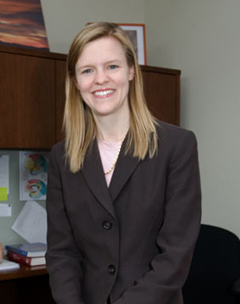Published: June 2008
k
Audio clip: Adobe Flash Player (version 9 or above) is required to play this audio clip. Download the latest version here. You also need to have JavaScript enabled in your browser.
Total time: 15:55
When Elizabeth Kensinger was a psychology graduate student working with aging adults and Alzheimer’s disease patients, she realized that although it seemed obvious to caregivers that people were more likely to remember experiences associated with strong emotions, most researchers studying memory measured “college-aged students’ abilities to remember lists of unrelated words or line drawings.” Now an assistant professor of psychology and director of Boston College’s Cognitive and Affective Neuroscience Laboratory, she investigates how age and emotions influence the formation and retrieval of memories.
“Tasks used in our laboratory have ranged from asking octogenarians to report what they can remember about photographs to asking BC hockey players to remember positive and negative events from the hockey season while undergoing a functional magnetic resonance imaging scan,” says Kensinger. The research, supported by the National Science Foundation, the American Federation for Aging Research, and the Dana Foundation, has validated her intuition that “we cannot understand memory processes without understanding how they are influenced by emotion and aging.” In dozens of articles and presentations during the last eight years she has reported that emotions significantly influence whether and how people remember experiences, that an emotion’s positive or negative valence affects the accuracy of recollections (negative emotions enhance accuracy), and that neural imaging techniques reveal physical changes in the brain indicative of a connection between strong emotions and memory.
This spring Kensinger was named a Searle Scholar—the first Boston College faculty member to receive this honor, which provides “exceptionally creative and productive young scientists with sufficient funds to work on their best ideas.” Boston College also awarded her its Junior Faculty Distinguished Research Award on May 2. @BC presents an interview with Elizabeth Kensinger, conducted on June 19, in which she discusses her recent work.

